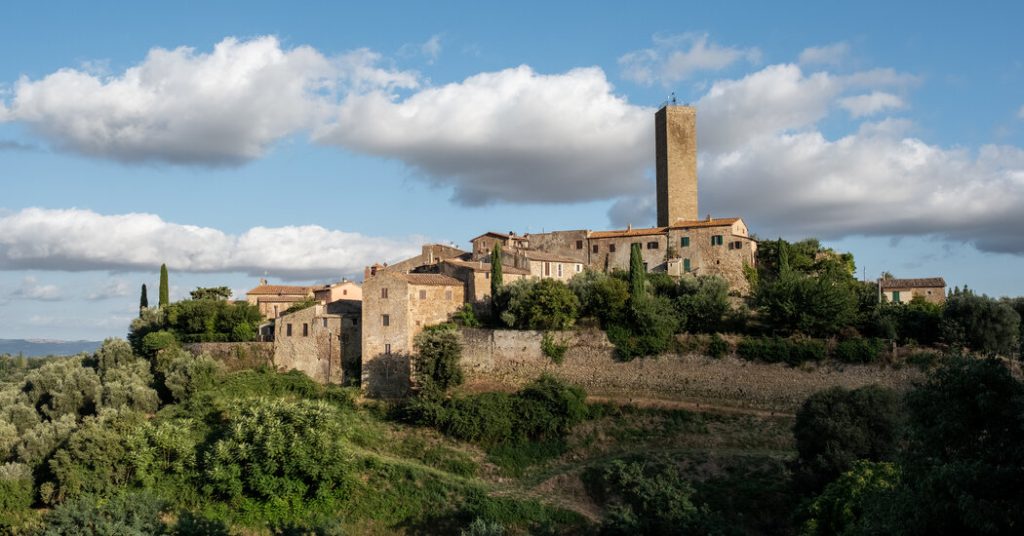Exploring Maremma, a Quiet Corner of Italy
9 min read
I woke up to the braying of donkeys. Opening the window to morning air perfumed by wisteria and honeysuckle, I could see the herd — 16 sweet-eyed animals in all — grazing by the olive groves of La Pescaia, a country estate turned idyllic inn that embodies a fantasy of pastoral happiness for me: life among animals and bird song and olive trees, encircled by the rugged nature of Maremma, in Italy.
The most sparsely settled area of Tuscany, spilling slightly into northern Lazio, Maremma retains vast swathes of nature reserves and uncontaminated woodlands, and over a series of visits, I took a deep-dive into countryside Zen, with horseback trips, hikes, bike rides, swims at protected beaches and improvised field sessions of donkey therapy.
“Here your days follow the cycles of the weather, animals and plants, and that natural rhythm gives life a sense of serenity,” said Margherita Ramella, who owns La Pescaia with her sister Beatrice. The siblings abandoned their careers in Milan to cultivate this rural endeavor.
My own rural mission began on horseback. In Maremma, traveling by horse was the customary way — long the only way — to navigate the dense and swampy territory, and the old horse trails endure, cutting through secluded woods and overgrown fields, past vineyards, farmland and the occasional quaint medieval village rising among the hills.
The butteri, Maremma’s unique brand of cowboys (and some modern-day cowgirls), are no longer numerous yet remain an active and integral part of the area’s identity. They chaperone packs of the Indigenous lyre-horned Maremmana cows, riding robust, wide-torsoed Maremmano horses in a tradition that some say dates back to the ancient Etruscans — rendering Maremma one of few places to possess such an enduring and vital equestrian link.
Tenuta di Alberese, a farm with 400 Maremmana cows run with support of the region of Tuscany, allows visitors to accompany the butteri on their daily horseback rounds — a task requiring a 7 a.m. start-time and enough expertise to gallop alongside them for several hours as they do the arduous work of herding (far more than what I, one morning’s feeble observer, possessed).
At La Pescaia, once famed for raising racehorses, there are horseback lessons, daylong excursions and nighttime full-moon rides for all levels. One early evening on my first visit there, my group saddled up at the pen and rode uphill through an enchanted-looking copse of gnarled cork trees, with the horses trampling wild mint and everlasting flowers under their hooves that released a balsam and absinthe tang into the damp evening air. Unsullied by city smog, the air was not just clean — it was charged with scent. An hour later, we came to a hilltop olive grove where an aperitivo of white wine and the farm’s own jams, honeys and local cheeses were set on a gingham-covered table. We watched the sun set over reddening wheat fields and forests before we rode back down as cicadas thrummed the arrival of dusk.
Dinner drawn from the land and sea
That night, in Castiglione della Pescaia, a half-hour’s drive towards the coast, a six-course dinner at Posto Pubblico included a spring salad with fresh peas and sea asparagus, a plate of charred octopus marinated in beets, and a dessert of buffalo milk gelato. For its ambitious cuisine, the restaurant sources high-quality, small-production ingredients from independent farmers and winemakers — a growing phenomenon in Maremma.
“A new generation took an interest in farming in the pandemic, and they’re doing it with biodynamic and sustainable methods,” said Alessio Cech, the talented young chef who opened the restaurant in 2016 with his brother Giulio.
Posto Pubblico is a standout gem for those interested in creative cooking, with a prix fixe tasting menu as well as more affordable pizzas, and on the restaurant’s romantic cobblestone piazza of tables (appropriately located on Via dell’Amore), preparations are underway to turn a medieval church depository into a natural wine bar offering casual dining, opening this autumn.
Through the fields on horseback
For an extended horseback journey, I met Piergianni Rivolta at his ranch in Civitella Marittima, from which he runs small group trail riding tours. Rain aborted our planned two-day excursion to the waterfalls of Val di Farma because some of the river crossings risked flooding, but we set out on another path, straddling our Maremmano horses on the cushy, horsehair-stuffed scafarda saddles that the butteri use.
“Maremma has a tradition you can’t find anywhere else today, but it’s fading, and the butteri, the old trails, and the nature here need to be protected and maintained,” said Mr. Rivolta, a rough-hewed, latter-day Robert Redford in a flat-brim fedora. I followed him, riding past a flock of sheep and vineyards of Sangiovese grapes, and then past fields of waist-high wheat and tracts overtaken by crimson clovers, yellow daisies and the amethyst blossoms of wild-growing peas.
We waded through rivers, and through meadows of spindly broom flowers grown thick and taller than our heads, where our horses blindly forged the way through the yellow nebula of blooms. Both days, we rode for hours without seeing a car or another human being, encompassed by nature so vividly bushy after the downpours that it seemed to grow before our eyes.
A tiny town and an exquisite inn
On a later visit, I went further south in Maremma’s interior, where I found Johnny Petrucci and Elizabeth Silvestri settling comfortably into small-town life after relocating during the pandemic from Rome to minuscule Pereta, a hilltop village of mostly medieval stone dwellings. There, the couple has converted a family home into Locanda Sospesa — a guesthouse of frescos, silk-covered walls and satin brocade curtains that lovingly recaptures the antique interiors of the residence, as if the velvet ropes at one of Italy’s great house museums were lifted to allow visitors to sleep in the display bedrooms.
“Covid gave us the freedom to change everything,” Mr. Petrucci said, as we regarded the hills from the balcony above their gardens. The steep slopes of forests and fields sprawled as far as the eye could see — an unending vista of greenery epitomizing the Arcadian experience of Maremma. “The city always felt like an external force working against me,” Ms. Silvestri said, a tabby cat purring contentedly on her lap in the sunshine. “But here I feel like I’m a part of nature.”
The pair arrange activities designed to give guests greater proximity to the local culture and landscape — hiking and cycling tours, horseback rides, lessons in basket-weaving with Maremman grasses, falconry demonstrations and more. I visited the hot springs of Saturnia, swimming in the bath-warm geothermal river, and tried a bioenergetic massage, but missed my chance to go asparagus hunting with Poldo Cirillo, a Pereta resident known for his foraging expertise.
Mr. Cirillo was busy when I arrived, as was the entire town, with Pereta’s annual festival — a cheese-tossing contest (this year, won by a female cheese-tosser for the first time ever), which was accompanied by bawdy accordion songs, wine served plein-air in plastic cups and a parade of children dressed in Renaissance finery — but ordinarily the sleepy village with just 67 residents in its center is a destination for travelers seeking calm.
The following morning, I set out on a hiking trip with Rudston Steward, a onetime New York party promoter who today leads the Maremma Safari Club, offering multiday hiking tours. We walked for hours, past yellow hills of rapeseed flowers, fields of chestnut trees, abandoned farmhouses and wild-growing asparagus, which Mr. Steward showed me how to pick.
“After Covid, people have become much more open to this kind of trip,” he said. “We evolved to walk and it works at a deep level on our brain. After all, travel should change your mind-state.”
By the time we reached a peak in the town of Monticello Amiata, my head was hushed and unburdened by the looming deadlines that usually haunt it. There, we lodged at Le Pianore, a farm-stay run by a family from Naples who had relocated to the Maremma countryside. They fed me a bountiful risotto dinner before sending me to bed in a new cabin built entirely of biodegradable straw and clay.
To the seashore
In the following day’s sunshine, along a thin tongue of coastal terrain connecting mainland Orbetello with the island of Monte Argentario, I arrived to a pier full of tables where the rustic restaurant I Pescatori serves fresh fish from the surrounding lagoon. With the water spreading out before me, I lunched on smoked eel and grilled mullet caught by the fishermen in the local cooperative. Since 1946 it has run this eatery as a showcase of the seaside’s simple cuisine, and as a support for small-time fishermen facing competition from fish farms and commercial trawlers.
After lunch, on a rented bike, I pedaled along the cycling path of Orbetello’s land-bridge and circled some of Monte Argentario. The island is a destination for fancy folks docking their yachts and sailboats, and home to the high-end Hotel Il Pellicanoand La Roqqa, Maremma’s much-anticipated new luxury hotel designed by the Milan design studio of Palomba Serafini, scheduled to open this month.
The Feniglia beach, a marine reserve of crystalline sea with pale sand and dunes of resin-redolent mastic brush, is largely free of Italy’s scourge of beach clubs. After a swim, I had to brake on my bike for a 20-strong troop of wild boar crossing the trail in front of me, with the adults shepherding babies along like a well-organized school field trip.
Wild boar is closely associated with Maremma — its outback and its cuisine — and the game meat was a star of the menu at Ristorante Fontanile dei Caprai that evening. Originally founded to provide sustenance to hunters in the nearby fields, today this eateryserves straightforward Maremman dishes in a wood cabin and on its outdoor terrace facing vineyards and the sunset.
My trip closed at the Parco della Maremma, home to the Tenuta di Alberese where I’d previously visited the butteri, and which comprises an expanse of protected land larger than Manhattan. Bikes, canoes and bird watching tours available are available, but on my last day, I just wanted to walk. From a high path along a rocky slope, I could see the umbrella pines below with their fir tops like fluffy cumulus clouds reaching all the way to the sea.
Accompanied by a chorus of trail-side frogs, I eventually wove my way through the woods to a beach with the Collelungo watchtower, a blocky 16th-century anti-pirate lookout. Underneath, on the long stretch of luminous sand bracketed by juniper bushes, the only man-made structures were makeshift lean-to shelters of sticks that had washed ashore. I took my last swim, gazing back at this dazzling green territory of wild boar and native horses, and tried to fix in my head this transcendence, this feeling of being a part of Maremma’s untamed nature.
If you go
Maremma offers the opportunity for a deep dive into nature, with horseback trips, hikes, bike rides, and swims at protected beaches. Here, places to stay, dine and book your adventures.
La Pescaia Resort in Sticciano is a 16th-century country villa and horse farm transformed into an elegant inn with riding opportunities (rooms from €280 a night, or $307).
Tenuta di Alberese, located in Alberese, is a state-funded farmstead with Maremmana cows offering visitors the chance to accompany its squad of butteri as they tend to the herd on horseback (€60 for an approximately four-and-a-half hour excursion).
Posto Pubblico in Castiglione della Pescaia is an ambitious restaurant with local farm-sourced ingredients which is expanding to include a natural wine bar (six-course tasting menu, €70 plus beverages; pizza from €10; wine from €6 a glass).
Corte di Ardengo, in Civitella Maritima, offers horseback rides from two hours to weeklong journeys with owner Piergianni Rivolta (starting from €50 for a two-hour ride).
Locanda Sospesa, in the hilltop town of Pereta, has turned a family home into a guesthouse with antique interiors (rooms from €180 a night).
Maremma Safari Club, based in Cinigiano, leads mult-day group hiking tours through Maremma and elsewhere with lodgings and meals included five-day hikes, €1,795)
Le Pianore, in Monticello Amiata, is an eco-friendly and family-run farm-stay (doubles from €120 a night).
Cooperativa I Pescatori in Orbetello, a casual restaurant, is run and supplied by a collective of local fishermen (about €25 for two seafood courses, plus beverages).
Ristorante Fontanile dei Caprai, in Marsiliana, originally supplied sustenance to hunters in the area’s woods and now serves traditional cuisine to all comers (about €25 for two courses, plus beverages).
Parco Regionale della Maremma, in Alberese, is a nature reserve set along more than 15 miles of coastline, with hiking, cycling, canoeing, horseback, and bird watching itineraries (entry is €10).
Follow New York Times Travel on Instagram and sign up for our weekly Travel Dispatch newsletter to get expert tips on traveling smarter and inspiration for your next vacation. Dreaming up a future getaway or just armchair traveling? Check out our 52 Places to Go in 2023.





